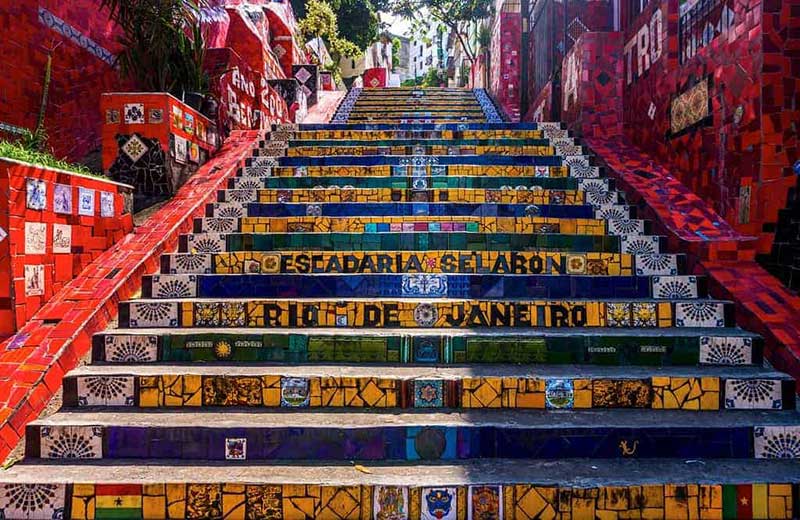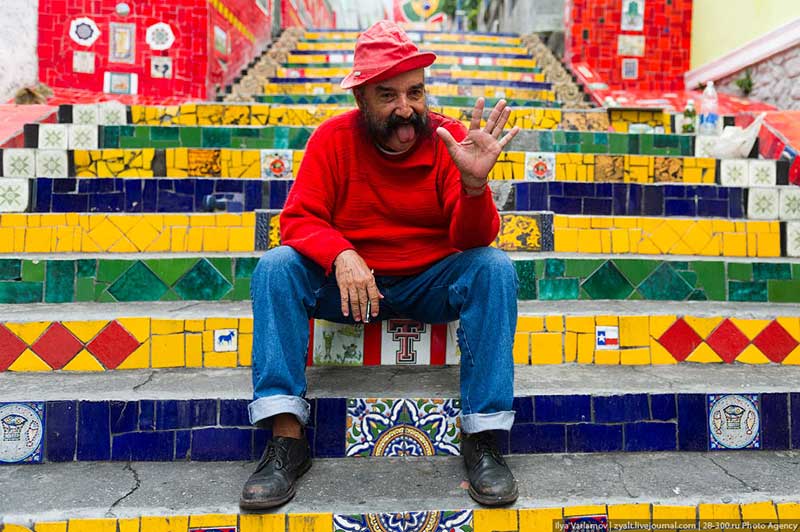 In the vibrant city of Rio de Janeiro, tucked away in the neighborhood of Santa Teresa, lies a staircase that serves as both a striking artistic masterpiece and a testament to human determination. cupo explores the captivating history of Escadaria Selarón, a mosaic-covered staircase that has become an iconic symbol of Rio’s cultural heritage.
In the vibrant city of Rio de Janeiro, tucked away in the neighborhood of Santa Teresa, lies a staircase that serves as both a striking artistic masterpiece and a testament to human determination. cupo explores the captivating history of Escadaria Selarón, a mosaic-covered staircase that has become an iconic symbol of Rio’s cultural heritage.
The Vision of Jorge Selarón
Escadaria Selarón owes its existence to the remarkable vision and relentless dedication of Chilean-born artist Jorge Selarón. In 1990, Selarón, who had adopted Brazil as his home, began his ambitious project of transforming the dilapidated steps near his residence into a vibrant work of art. He embarked on this endeavor as an homage to the Brazilian people, a tribute to their culture, and a symbol of his deep affection for Rio de Janeiro.Construction and Transformation
Over the course of two decades, Selarón single-handedly covered the 215 steps of the staircase with brightly colored tiles from all around the world. Each tile was meticulously placed, resulting in a mesmerizing mosaic that stretches from the base to the top. The continuous process of adding, replacing, and rearranging the tiles turned the staircase into a living artwork, forever evolving and captivating visitors from across the globe.Symbolism in the Tiles
The tiles adorning Escadaria Selarón carry profound symbolism. Selarón collected tiles from various countries, representing different cultures, histories, and identities. By incorporating these diverse elements, he aimed to celebrate unity in diversity. The staircase became a powerful representation of global interconnectedness, showcasing the beauty that emerges when people come together, despite their differences.
The Cultural Impact
Escadaria Selarón rapidly gained recognition as an extraordinary artistic creation and a significant cultural landmark. Its vivid colors and intricate designs began to draw artists, photographers, and tourists alike. The staircase has been featured in numerous films, music videos, and international publications, further cementing its status as an iconic attraction in Rio de Janeiro.Preservation Efforts
Following Selarón’s tragic death in 2013, the local community rallied to preserve his masterpiece. The city of Rio de Janeiro declared the staircase a cultural heritage site, ensuring its protection and maintenance. Conservation initiatives and ongoing restoration efforts have safeguarded the artwork against weathering, vandalism, and the passage of time, allowing future generations to appreciate Selarón’s enduring legacy.Tourist Attraction
Escadaria Selarón has become a must-visit destination for tourists exploring Rio de Janeiro. The staircase’s allure lies not only in its artistic splendor but also in the stories it tells. Visitors are captivated by the mosaic’s rich symbolism, the history embedded in every tile, and the harmonious fusion of cultures represented. Escadaria Selarón offers a truly immersive experience, inviting people to engage with art on a personal and emotional level.Local Community and Artists
The presence of Escadaria Selarón has had a profound impact on the local community. The staircase has become a meeting point for artists, creatives, and enthusiasts, fostering a sense of belonging and collaboration. It has inspired the growth of a vibrant art scene in Santa Teresa, with galleries, workshops, and cultural events springing up in the vicinity. Escadaria Selarón stands as a testament to the power of art to transform lives and communities.ถนนข้าว แต่ละภาค
Selarón’s Legacy
Jorge Selarón’s legacy lives on through the masterpiece he left behind. His extraordinary vision, tireless dedication, and profound love for Brazil continue to inspire artists and art lovers worldwide. Escadaria Selarón serves as a reminder that art transcends boundaries, connecting people through shared experiences and emotions. It stands as a lasting tribute to the transformative power of creativity.Conclusion
Escadaria Selarón is more than just a staircase. It is a living testament to the indomitable spirit of Jorge Selarón and the universal language of art. As visitors ascend the vibrant steps, they embark on a journey through culture, history, and human connection. The mosaic-covered staircase has become an enduring symbol of Rio de Janeiro’s cultural fabric, capturing the hearts and imaginations of all who encounter its vibrant beauty.What is the Connection Between Escadaria Selarón and Rio Carnival’s History?
What is the connection between Escadaria Selarón and Rio Carnival’s history? The fascinating history of rio carnival unfolds through the iconic steps of Escadaria Selarón. This vibrant staircase, adorned with colorful tiles, is a tribute to the carnival’s energy and flamboyance. Each step represents the essence of Rio’s annual extravaganza, tying the legacy of the celebration with this architectural masterpiece.
